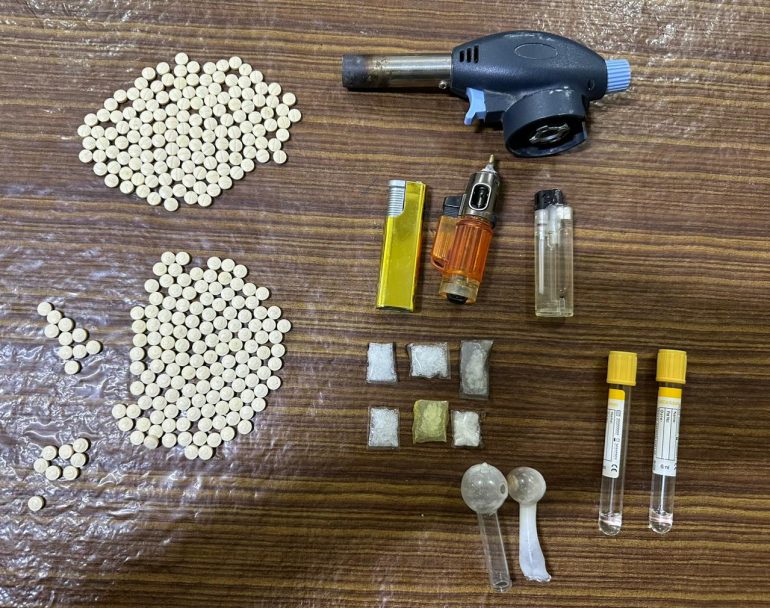For seven years, Mohammed has ingested nearly a dozen Captagon pills daily. Now, with Iraq facing a significant drug crisis, the 23-year-old yearns for a new beginning.
Bordering Iran, Syria, and Saudi Arabia, Iraq has long served as a transit country for the region’s burgeoning trade in amphetamine-type drugs and other narcotics.
However, in recent years, Iraq has seen a stark surge in drug abuse, pushing authorities to seek solutions by both enforcing stricter measures against traffickers and offering assistance to addicts.
Methamphetamine, or crystal meth, chiefly from Afghanistan or Iran, ranks among the most prevalent drugs in Iraq today. Captagon, produced on an industrial scale in Syria and smuggled via Iraq to Saudi Arabia and other affluent Gulf states where it has become infamously popular, is also prevalent.
Using a pseudonym, Mohammed is one of roughly 40 patients undergoing treatment at a rehabilitation clinic that the Iraqi Health Ministry inaugurated in Baghdad in April.
The young man, a resident of the western Al-Anbar province bordering Syria, told AFP his work colleagues at a grocery store first introduced him to Captagon, also known as “zero-one”.
“It makes you active, gives you energy and keeps you awake,” he said.
From the age of 16, Mohammed confessed, “10 to 12” Captagon pills a day was his routine. Priced at around $2 each, the stimulant is ubiquitous.
Like the other patients at the Al-Canal Centre for Social Rehabilitation, Mohammed sought help at the clinic on his own accord.
After an initial two-week stay, he returned home, only to hastily revert to the clinic, apprehensive of a possible relapse.
“Captagon, leads you either to prison or to death,” Mohammed said.
In the relaxed setting of the rehab center’s gym, men of nearly all ages were spotted playing table tennis and foosball, a few of them smiling. Others appeared visibly exhausted or wore vacant expressions.
Patients typically reside for approximately one month at the facility, which also features a women’s wing and provides psychological support. Post-discharge, they revisit for weekly assessments over a span of six months.
“We host all ages. It starts at 14-15, but most are in their 20s,” said Abdel Karim Sadeq Karim, the clinic’s director.
The facility primarily treats crystal meth abuse. “From the very first dose, there’s addiction,” Karim stated.
His deputy, Ali Abdullah, called it “a plague that totally destroys individuals”, highlighting an increase in drug use in Iraq since 2016.
Currently, Iraqi security forces are announcing almost daily drug busts and arrests, with operations supported by intelligence and collaboration with neighboring countries.
Hussein al-Tamimi, spokesman for Iraq’s narcotics directorate, told AFP that authorities had arrested more than 10,000 suspects between October and June for “crimes related to narcotics—traffickers, resellers, or consumers”.
According to the government agency, security forces also confiscated 10 million Captagon pills and 500 kilograms (1,100 pounds) of other drugs, including at least 385 kilograms of crystal meth.
A regional meeting, hosted by Baghdad in May, resulted in “the creation of a shared database” for exchanging information among authorities across borders, Tamimi said. The meeting also facilitated “the establishment of weekly contacts between our services and the competent services of Arab states,” and other countries in the region, he added.
Based on official records, an AFP tally reveals that at least 110 million Captagon pills have been seized across the Middle East this year.
In mid-July, Iraq’s interior ministry disclosed the uncovering of a rare Captagon manufacturing lab in the country’s south.
This was the first announcement of its kind in a country where drug production is virtually non-existent.
A Western diplomat stationed in Baghdad told AFP that a part of Iraq’s rising significance for Captagon trafficking may be due to stricter enforcement in neighboring Jordan.
Amman has bolstered its borders to sever trade routes through its territory and established a forum to combat smuggling from Syria. Jordanian security forces frequently open fire at suspected drug traffickers.
Around seven years ago, Iraq was almost exclusively a transit country, but this has gradually shifted as drugs have begun to substitute payment for rights of passage, said the diplomat, who requested anonymity.
This domestic resale has spurred local consumption and “potentially… a real market,” the diplomat added, noting the high percentage of young people among Iraq’s population of 43 million.
Recognizing the dangers, the government has established three rehabilitation centers—in Al-Anbar province, Kirkuk in the north, and Najaf in central Iraq—with plans to extend the program to other provinces.
These centers aim to provide a recovery place for arrested addicts, away from the traffickers in prison.
AFP


